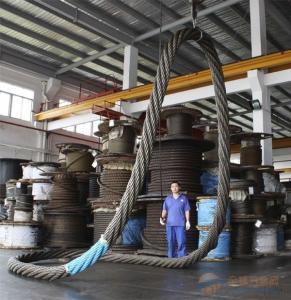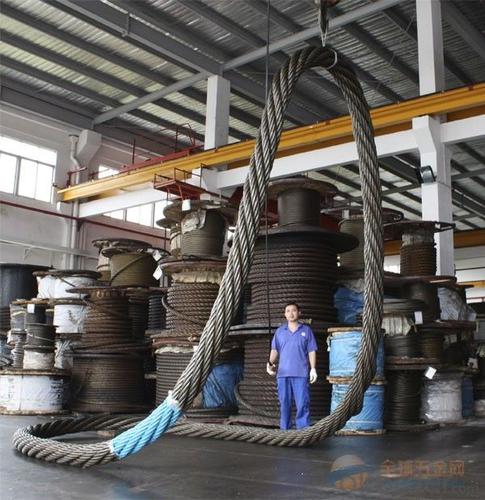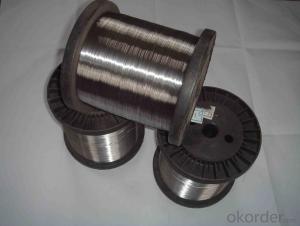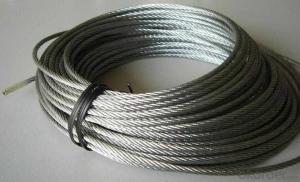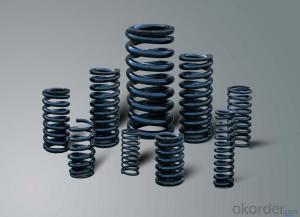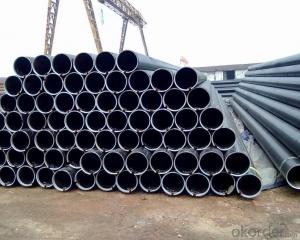302 Stainless Steel Spring Wire For Crane Hot Sale and High Quality
- Loading Port:
- Shanghai
- Payment Terms:
- TT OR LC
- Min Order Qty:
- 50 m.t.
- Supply Capability:
- 300 m.t./month
OKorder Service Pledge
OKorder Financial Service
You Might Also Like
1.Packing And Delivery
Package: Seaworthy package
MOQ: 0.5 tons
Delivery: 15-20 days
Monthly Output: 100 tons
Payment : 30%T/T in advanced+70% balanced;irrevocable L/C at sight
Remarks: All-risk insurance and accept the third party test
Port : Shanghai
AISI 316 high tensile strength stainless steel spring wire
| Detail as follows: | |
| Standard | AISI,ASTM,GB,SUS etc |
| Grade | 201,202,204,301,303,304,304L,310,316,316L etc |
| Diameter | 0.7mm-14.0mm |
| Surface | Bright or matt |
| Condition | hard |
| Tolerance | +/-0.03mm |
| Length | According to customers’ requirement |
| Packing | Packed by weaved bag or according to customer's requirements |
| Technology | Cold drawn |
| Application | Spring |
| Productivity | 300 tons/month |
| MOQ | 100KG |
| Note | We can produce other standard as the customers' requirement |
ODM&OEM SERVICES | |
Service | Drawings or samples processing/OEM/ODM service provided |
Produce Process | Drawings→ mould making → pre-forging →rough machining or finish machining →surface treatment →product checking and quality control→ packing →delivery |
Forging Material | Carbon Steel, Alloy steel, Stainless steel |
Standard | ISO, GB, ASTM, DIN, JIS |
Produce Equipment | Friction Screw Press Series, CNC Lathe, Machining Center (Vertical Spindles), CNC Milling Machine, Bench Drilling Machine, Heat Treatment Equipments and so on. |
Surface treatment | Heat treatment, Polishing, shot blasting, Painting, Electro-plating, Chemical Plating, |
Inspection Equipments | Metallurgical analysis, tensile strength tester, Hardness tester, Altimeter, Scale Micrometer, pressure tester, etc. |
Delivery | Samples are sent by express Large quantity products delivered to customer by sea or according to your request |
Terms of payment | T/T or L/C |
1. Competitive price and quality from our own factory
2. Approved by ISO9001, CE, SGS every year
3. Best service with 24 hour`s reply
4. Flexible payment with T/T,L/C , paypal, kunlun bank, western union, etc.
5. Smooth production ability(50000tons/month)
6. Quick delivery and standard exporting package
7. OEM/ODM
- Q: Are steel pipes suitable for underground mining operations?
- Yes, steel pipes are suitable for underground mining operations. Steel pipes are known for their durability, strength, and resistance to corrosion, making them ideal for use in harsh underground mining environments. They can withstand high pressure and are capable of transporting various substances, such as water, air, or mining materials, with reliability and efficiency. Additionally, steel pipes can be customized to meet specific mining requirements, ensuring their suitability for underground operations.
- Q: How do you repair damaged steel pipes?
- To repair damaged steel pipes, the first step is to assess the extent of the damage. If it's a small crack or hole, it can be fixed using a steel-filled epoxy or a pipe repair clamp. However, for more significant damage, such as extensive corrosion or a large rupture, cutting out the damaged section and replacing it with a new pipe is usually necessary. In some cases, professional welding or soldering may be required to ensure a secure and leak-proof repair.
- Q: How are steel pipes insulated to prevent noise transmission?
- Steel pipes are typically insulated to prevent noise transmission by using materials such as fiberglass or mineral wool wraps. These insulating materials are wrapped around the pipes, creating a barrier that absorbs and dampens sound waves, reducing noise transmission. Additionally, acoustic lagging or jackets can also be applied to further reduce noise and vibration.
- Q: How long do steel pipes typically last?
- Steel pipes typically have a lifespan of 50 to 100 years, depending on various factors such as the quality of the steel, installation conditions, maintenance, and exposure to corrosive elements.
- Q: Can steel pipes be used for the construction of railway tracks?
- No, steel pipes are not suitable for the construction of railway tracks. Railway tracks require specialized rails made of steel that are specifically designed to withstand the heavy loads and constant wear and tear associated with train traffic. Pipes do not have the necessary shape, strength, or durability to serve as railway tracks.
- Q: How are steel pipes sized and classified?
- Steel pipes are sized and classified based on their outer diameter, wall thickness, and length. The sizing is done using standard measurements such as nominal pipe size (NPS) or nominal diameter (DN). Classification is determined by factors such as the pipe's pressure rating, material composition, and intended use. This helps ensure compatibility and proper installation in various applications such as plumbing, construction, and industrial processes.
- Q: How do steel pipes handle seismic expansion joints?
- Steel pipes handle seismic expansion joints by incorporating flexible joints or bellows in the pipeline system. These flexible joints are designed to absorb and accommodate the movement caused by seismic activity, allowing the steel pipes to expand and contract without causing damage or failure to the overall pipeline system.
- Q: What is the role of steel pipes in HVAC systems?
- Steel pipes are essential components in HVAC systems as they are used to transport hot or cold water, steam, and air throughout the system. They provide a reliable and durable conduit for the distribution of heating, ventilation, and air conditioning, ensuring efficient and effective operation of the system.
- Q: Are steel pipes suitable for underground cable protection?
- Indeed, underground cable protection can be achieved through the use of steel pipes. These pipes boast remarkable durability and strength, rendering them an optimal choice for safeguarding cables against external elements such as physical harm, wetness, and corrosion. They are capable of enduring the soil's weight and any potential pressure from above, guaranteeing the cables' security and protection. Furthermore, steel pipes can be effortlessly welded or connected to establish a continuous and flawless conduit, thereby bolstering their efficacy in underground cable protection.
- Q: Can steel pipes be used for firefighting systems?
- Yes, steel pipes can be used for firefighting systems. Steel pipes are commonly used for their durability, strength, and resistance to high pressure and heat. They can effectively transport water or other fire suppressants to extinguish fires efficiently, making them a reliable choice for firefighting systems.
Send your message to us
302 Stainless Steel Spring Wire For Crane Hot Sale and High Quality
- Loading Port:
- Shanghai
- Payment Terms:
- TT OR LC
- Min Order Qty:
- 50 m.t.
- Supply Capability:
- 300 m.t./month
OKorder Service Pledge
OKorder Financial Service
Similar products
Hot products
Hot Searches
Related keywords
